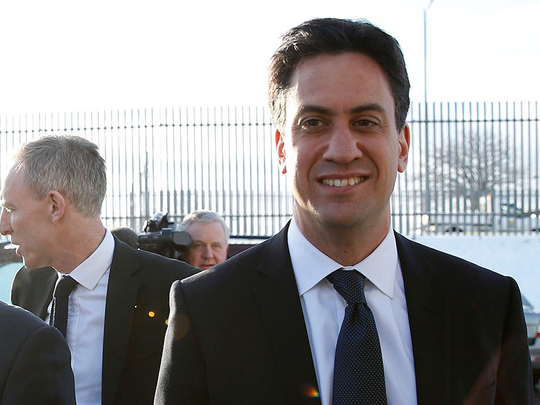
The parliamentary elections in the United Kingdom this May may be remarkable for being indecisive as neither of the two leading parties — Labour and the Conservatives — is expected to get a clear majority, according to current opinion polls. Though every party tries hard to lure voting blocs outside the mainstream electorate — courting, for instance, fox-hunting groups, feminist groups etc — this year, what can be described as the ‘Muslim vote’, has been added to that group. It will not be right to say that the British Muslim vote is a single bloc, but with the rise of Right-wing parties like United Kingdom Independence Party (Ukip), mainstream parties are targeting Muslim voters. By playing on fears about the far-Right, Labour and the Tories, along with Liberal Democrats, are competing to gain the votes of British Muslims.
A hung parliament is a possibility, even more so than in 2010, when the coalition with Liberal Democrats made it possible for the Tories to form the government. That simply makes every House of Commons seat very significant and the traditionally ‘safe seat’ for a certain party in a certain constituency may no longer be a sure thing. Foreign policy is not conventionally an issue in a general elections — except for major developments in which Britain takes part like, for instance, the Iraq war. But even that was not the basis for the British electorate to vote Labour out of office. If it was not for the economic conditions as a result of the global financial crisis, it would have been enough to just unseat Tony Blair but keep Labour’s Gordon Brown in power.
Greece may have elected a Leftist party, but that is because Greeks oppose the austerity measures linked to the restructuring of their economy. The far-Right might be on the rise in France or Germany, but unless British voters test their economic credentials, they will not vote the far-Right in, though the British version may have some appeal because of its anti-immigrant slogans. The top priority for UK voters is what directly affects their daily lives: Jobs, the National Health Service (NHS), education, housing, taxes, social benefits etc. Even immigrants who have acquired British citizenship vote along the same socio-economic lines, including British Muslims of course. Traditionally, constituencies with a large number of Muslim voters are safe Labour seats — that is primarily because Labour is understood to mean better policies for the middle and working classes. As the lines between Labour (more Centre-Left now) and Tories (more Centre-Right now) have blurred, some voting trends have changed. Muslim votes also shifted from Labour to the Lib Dems, or other smaller parties and independent candidates.
A recent study by the Muslim News newspaper found that up to 40 seats could be decided through the Muslim vote. That is highly significant as a recent national poll indicated that only 33 seats could decide which party would form the new government. No exaggeration there if we look at the latest census figures (2011) from the Office of National Statistics: The UK Muslim population in 2011 was 2,786,635, that is 4.4 per cent of the total population. According to another poll cited by the newspaper, 50 per cent of Muslim voters identify themselves with Labour, though in the last general election (2010), Labour got only 40 per cent of the Muslim vote. That is the largest bloc for a single party, with the remaining half of the vote divided between the Tories, Lib Dems, smaller parties and independent candidates. With heightened ethno-religious tensions across Europe, UK may not escape an impact on the election results in May.
The Muslim News study said that all the 40 seats mostly decided by the Muslim vote, except one, will be Labour. But Muslims, as part of the general British electorate, are not yet convinced. Labour can do better on matters that concern them most. In times of tension, Labour is still suffering from what is known as the ‘protest vote’ — i.e. traditionally Labour affiliates punishing the party by voting for others and not because they favour that ‘other’. Those dissatisfied with Labour may not vote Tory, but they indirectly help them score better than Labour. Take the example of what happened in the last general election in 2010 in Dewsbury, a Labour seat since 1987, with a Muslim population of 18.5 per cent. A large number of Muslims were not happy with the incumbent Labour MP, Shahid Malek. They, therefore, voted for an independent Muslim candidate, Khizar Iqbal, to punish Labour. The result was that Labour lost to the Tories.
Though the Tories’ outreach for Muslim votes is being criticised by Muslim figures in the party (Baroness Sayeeda Warsi resigned from her senior position attacking the Tories’ approach to British Muslims), they are trying to make the best of these possibly ‘swing’ seats decided by Muslim votes. Muslim Cabinet Minister Sajid Javid is seen as a potential contender for the Conservative Party leadership. Yet, all these Muslim politicians in the main parties are not necessarily applauded by common British Muslims. Many, especially the young, consider them to be ‘more Royal than the King’. They are seen as people pursuing their own interests, not those of the Muslim community. The Muslim News study does not suggest voting trends, but with the general uncertainty about Labour’s appeal in Britain and dissatisfaction among Muslim voters in the 40 constituencies, Muslim ‘protest vote’ against Labour will help Tories.
Dr Ahmad Mustafa is an Abu Dhabi-based journalist.







